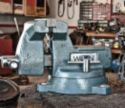Manufacturing is the engine that made America prosperous.
Modern manufacturing will play a pivotal role in our long-term economic vitality.
Welcome to GreatManufacturingStories.com.
Wilton: A Manufacturer Adapts to 73 Years of Challenges and Opportunities
- 5-12-2014
- Categorized in: Iconic Products


Back in 1941, Hugh Vogl, a Czech immigrant, launched a business in Chicago, manufacturing a high-quality vise. The product’s unique design created a central pull that completely eliminated dead motion. He named the product line Wilton after the street on which the factory was located. Soon after the company’s launch, the U.S. entered World War II, and the federal government became Wilton’s sole customer.
The conclusion of the war led indirectly to the first crisis in the company’s history. Once the war ended, the government unloaded surplus hardware on the open market at reduced prices, making it virtually impossible for Wilton to sell new products at competitive prices. This nearly resulted in the end of the company. However, the family-owned business eventually responded by introducing new products – high-quality C-clamps – and building a distribution network in the fast-growing auto industry. Through those two steps, Wilton was again a profitable and viable business in the 1950s.
Seeking growth opportunities to help the company weather the challenges of business cycles, Wilton began making smaller vises for the do-it-yourself and hobbyist markets in the early 1970s, and opened a second factory in Tennessee. This also proved to be a successful business strategy. Then in the 1990s, Wilton purchased the Warren Tool Group, which made the Columbian Vise in Cleveland.
One of the next challenges for the entire vise industry was that their products were so durable, they simply didn’t wear out, eliminating the need for replacements. Moreover, as a lot of manufacturing operations starting moving overseas, that trend also took a toll on demand. Ownership changes occurred in 2002 and again in 2014. Not surprisingly, the Great Recession posed another historic challenge for the company.
Wilton responded to reduced demand through diversification and innovation. They retained some manufacturing in the U.S., while shifting some to China. They introduced other tools, and now offer brass sledgehammers with unbreakable handles; road-ready vises for use on all-terrain vehicles; a variety of F-clamps and C-clamps; and specialized Wilton vises with advanced features for use in drill press and milling applications.
The Wilton Tool Company is now headquartered just outside of Nashville, with a manufacturing facility in Carpentersville, Illinois. As it prepares to celebrate its 75th anniversary in 2016, Wilton remains an example of perseverance in the manufacturing industry.
Forum on Manufacturing
-
Manufacturing Challenge
What is the greatest challenge facing your company this year?

